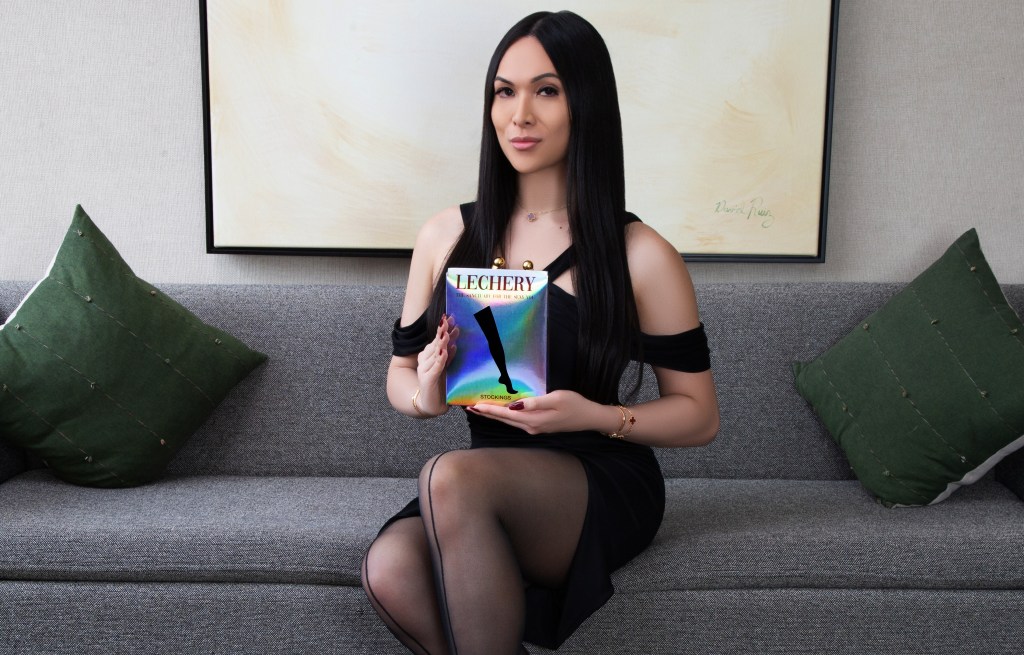Meet the 24-year-old trans asylum seeker whose fashion brand is now stocked at Macy’s

Vyra Scher is the founder and CEO of Lechery, an accessories brand with a focus on body positivity. (Vyra Scher/Lechery)
PinkNews speaks to Vyra Scher, CEO of fashion brand LECHERY, about her experiences as an Asian trans woman of colour and how she navigated her way to founding her own company.
With only $1,200 to her name, Vyra Scher arrived in the United States in 2019 as a trans woman of colour seeking asylum and the opportunity to live her own authentic life. Having ended up in New York to pursue her dream of working in the fashion industry, Scher had to live on stipends and take on unpaid internships while she waited for her immigration papers to clear.
Eventually, she landed a showroom position, but then the COVID pandemic locked down cities and, as she puts it, “my entire bubble burst.”
“There was this theme of fear and uncertainty that was going on,” she adds, “and I really wanted to take ownership of my own destiny as much as possible.”
With that in mind, Scher rebranded her existing fashion blog to LECHERY, an accessories brand focusing on hosiery. While learning how to launch her own business and wading through the asylum process at just 22 years old, Scher landed her first retail brand partnership with Nordstrom.
Fast forward two years later and LECHERY is now available at American big-box retailers like Target, Macy’s, Nordstrom and Kohl’s.

LECHERY’s rapid growth is all a credit to Scher’s vision, leadership and resiliency in the face of life experiences that included consistent rejection from her family, potential investors and even entire governments.
“I like to say that I’m not foreign to rejections or being told that I can’t,” she states.
Scher states without any exaggeration that growing up was a toxic experience. She recalls how unnamed “ex”-family members put her through years of emotional, physical and sexual abuse. In an effort to distance herself, Scher enrolled in a study abroad programme in Qatar, a country with some of the most inhumane laws that discriminate and criminalise the LGBTQ+ population.
One day, while at a shopping centre, Scher was detained by an undercover officer for wearing make-up. When her ID didn’t match her physical appearance, she was subjected to hours of interrogation, which ultimately led her to be deported or run the risk of going to prison.
“I was essentially caught for what they would describe as a crime for homosexual behaviour,” she explains. “And I was just, you know, being me.”
“When I say it’s a man’s world, it really is a man’s world.”
Vyra Scher, founder of LECHERY
After settling in New York and launching LECHERY, Scher was once again faced with rejection, discrimination and misogyny – this time from potential investors. It is no secret that there is a glaring disparity in female founders getting investments compared to men: a 2021 report from Bloomberg found that only two per cent of venture capital (VC) funding went to women.
“It’s just crazy to think that almost all of the VC funding is just going to male founders, mostly white men,” she declares.
“In addition to all the other challenges that women have to face in business, it’s also exponentially harder to get the same opportunity with raising capital versus what men have.”
Scher made a personal decision to stop seeking VC funding after what started out as a promising set of meetings with a potential investor led to being asked uncomfortable questions like “Do you have a boyfriend?” and “You’re so exotic, are you a model?”
During a meeting with this investor, she was put in a dangerous situation but was quickly able to find a way out of the situation.
Reflecting on that moment, Scher says: “I’m just going to bootstrap because I’ve already dealt with sexual abuse my entire life, I don’t need to continue experiencing that as a transgender woman.”
While Scher is understandably nervous about sharing this story, she believes the #MeToo movement has moved the conversation forward, but “there are still people who fear sharing because of the power and influence that these individuals can have.”
“When I say it’s a man’s world, it really is a man’s world,” she continues. “And sexual harassment and abuse are still very common in the workplace.”

LECHERY, the hosiery and accessory brand that Scher founded is more than just tights and hair accessories: it started out as a blog where she shared her personal experience of what made her feel sexy as a trans woman. Eventually, a community built on body positivity for all was cultivated.
“LECHERY is my way of reclaiming the years lost when I wasn’t living my true authentic self,” she confesses.
“Almost two decades of my life were taken away from me because of the past traumas I had to deal with growing up in an emotionally physically and sexually abusive [environment].”
Scher’s connection to leggings and tights goes deeper than aesthetics – it’s also about security and safety. After being sexually assaulted by a stranger when she was only 17, Scher wished she had a sense of protection from those types of traumatic moments that were sadly shaping her life.
“At that very moment, I was feeling that sense of powerlessness and ultra vulnerability. I really wish that I had some sort of protection, some armour against what was happening.”
From that moment, Scher made a conscious choice to include hosiery in her everyday routine, particularly in private, since she was still living with her family. That decision provided her with a sense of wearing a second skin and offered a kind of fashion armour, ensuring she never felt as exposed or vulnerable as she did in that particular moment.
“It’s really important to speak up about my identity as not only an entrepreneur – but a transgender woman entrepreneur.”
Vyra Scher, founder of LECHERY
Scher’s story should serve as inspiration for anyone that comes from a marginalised community, whether that be their immigration status, skin colour or gender identity. Her personal story is intertwined with LECHERY’s story, and Scher believes that story has helped the brand to reach early success.
“We make sure that we share our story with our customers about our take on sexiness, and how sexiness starts from within,” she professes.
“Our accessories are basically just like the cherry on top, in which they’re able to elevate how they feel when they wear our products.”
Scher believes that it is critical for trans and non-binary visibility within the start-up ecosystem. When she first launched LECHERY she wasn’t completely open about being a trans woman due to potential discrimination from potential buyers and retail partners. It’s only in the last year that Scher has become more open about sharing her trans identity.

“It’s really important to speak up about my identity as not only an entrepreneur – but a transgender woman entrepreneur, because that really helps battle the stereotypes that we’re lesser, or that we’re confused people or that we’re freaks.”
For other trans and non-binary people that are entering their own entrepreneurial journey, Scher’s best advice is “to ditch the background noise.”
“I think the trans and non-binary community are just like one of the most creative groups out there,” she says, “what really holds them back is the lack of self-belief.”
Scher can empathise with those experiencing self-doubt and fear of rejection, having dealt with it her entire life: “We’ve all dealt with discrimination, we’ve all been told certain things that really destroys our self-esteem.”
“It’s never easy being at the forefront of societal change, but that’s how it happens,” she concludes.
“It’s only once people see that we’re normal functioning people and that we’re competent business owners that the stigma will start to go away.”

